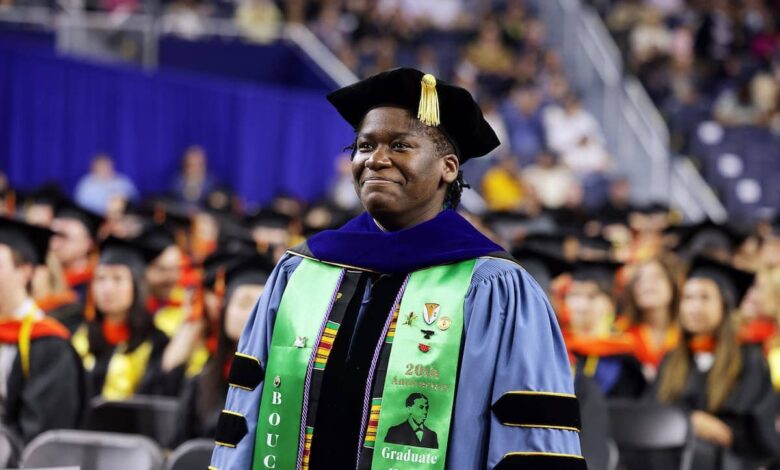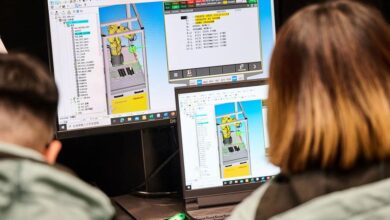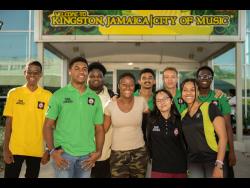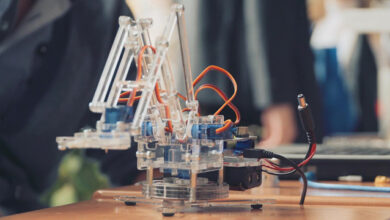First Black woman to earn U-M Robotics PhD speaks at commencement

Oluwami (Wami) Dosunmu-Ogunbi, the first Black woman to earn a U-M Robotics PhD, will speak at today’s University-wide commencement ceremony.
Many PhD students start programs without a clear idea of their end goals, and Ogunbi owns to being one of them. As she tells it, it was the hat—a hexagonal velvet beret with a golden tassel—that sold her on dedicating half a decade or so to the research enterprise after wearing her bachelor’s mortarboard. But now, as she graduates, she sees opportunities to use her engineering knowledge to improve the lives of other people.
“A Michigan Engineer is one who does not just provide scientific and technological leadership,” she said at the engineering graduate student commencement ceremony last Wednesday, “but also is one who is intellectually curious, socially conscious, creates collaborative solutions to societal problems, and promotes an inclusive and innovative community of service for the common good.”
The daughter of Nigerian immigrants, she came to U-M’s mechanical engineering PhD program decorated with academic honors—such as her MVP award from the University of Illinois’ Pi Tau Sigma chapter, the mechanical engineering honor society. But she failed her qualifying exams in the mechanical engineering PhD at U-M program.
Faced with exiting during the pandemic-induced recession, she turned to her mentor Chad Jenkins, a professor of robotics, for advice. It was clear to Jenkins that if a student like Ogunbi were leaving, something had gone wrong.
“Chad acted immediately, no hesitation,” she recounted at her PhD thesis defense. “He reached out to his networks and got Jessy on board.”
She referred to Jessy Grizzle, a professor of robotics who, like Jenkins, was one of the key architects of Robotics at Michigan. As a new program, with the first graduate students matriculating only a decade ago, Robotics set out to be inclusive by design.
Grizzle, who had intended to retire, welcomed Ogunbi to his lab as his final PhD student. He credits his students at the time for contributing technical and social support, creating an environment where she could thrive. Still, Ogunbi had to face her qualifying exams all over again. She faltered, but this time Kira Barton, a professor of robotics, and Robert Gregg, an associate professor of robotics, asked questions that rebuilt Ogunbi’s confidence and got her back on track.
“When Wami came out of her shell, she exploded with creativity and resilience, the two key features of a successful PhD,” said Grizzle.
In her research, Ogunbi had to be careful, working with an older robot for which manufacturer support ended during her studies. She wouldn’t be able to get spare parts if something broke. Grizzle’s Cassie Blue, a two-legged walking robot inspired by a flightless bird called a cassowary, was one of the first Cassie models ever made by Agility Robotics.
When it stopped working, Ram Vasudevan, an associate professor of robotics, provided his Cassie Maize robot so that Ogunbi could finish testing her control algorithm. She finished in four years, developing a new stair-climbing controller for bipedal walking robots as her chief result. While it was successful in simulations, she didn’t get the chance to see it work on Cassie, which Grizzle attributes to the robot’s high maintenance needs. However, she did perform the first demonstration of a bipedal robot stepping on, riding and stepping off a moving walkway.
“I do not stand here on my own two feet alone. None of us got here by our individual merit alone,” Ogunbi said at the engineering graduate commencement ceremony, recounting her own story of failure and support.
“I share this story to emphasize the critical importance for us to be socially conscious and promoting diversity, equity and inclusion in our solutions.”
Oluwami (Wami) Dosunmu-Ogunbi
Ogunbi has been an active community builder in robotics, earning an MLK Spirit Award from the College of Engineering for mentoring and inspiration as well as being named an outreach ambassador by Robotics for three years running, 2021-23. And she is a passionate communicator, named a runner-up in the College of Engineering’s 3-minute-thesis competition.
Beyond U-M, she has been inducted into the Bouchet Society, which recognizes outstanding scholarly achievement and promotes diversity in graduate education and the professoriate.
Ogunbi is currently interviewing for faculty positions.



